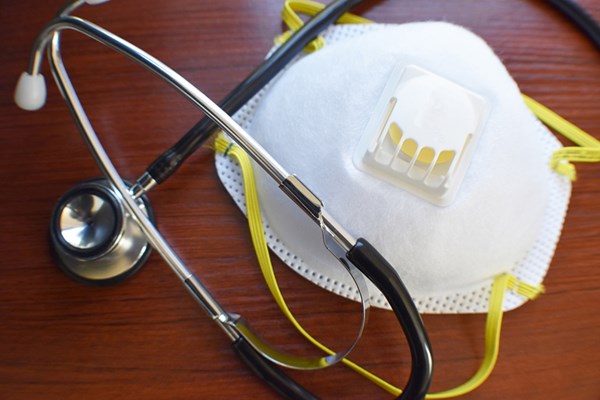I did not sign up to be on the front lines of COVID. But I am humbled to put on my armor and return each day, because there is no greater honor in life than to step up during a time of need.
It's night 6 of 6, with 51 clinical hours already logged in the books. Walking into shift, I'm thinking about all the "extra" things I have to do outside my clinical responsibilities - that Grand Rounds lecture I'm giving in 3 weeks; finishing up the next month's resident shift schedule; the dozens of medical student emails with questions about the upcoming residency application cycle needing responses.
The back doors of the ED open with a sign that says, "DO NOT ENTER" in big capital letters. Underneath, "Only clinicians treating ED patients permitted past this point." It serves as a reminder that most people, patients and hospital staff alike, are doing everything they can to stay away from the place where I've spent the most time during the past week.
It was eerily quiet, with no one in the lobby and no one in the Shock Resuscitation Unit, what we lovingly call the SRU ("shrew"). But I put on my armor anyway - N95, surgical mask, face shield - ready for the battle that will inevitably come. As I prepare to take sign out from my colleague, the telemetry phone rings. I answer, "University Hospital, this is MD 2104. Go ahead with report." I can sense the angst in the paramedic's voice as he tells me about incoming patients. I call out over the hospital system, "Trauma STAT, multiple GSW victims, ETA 5 minutes." The SRU went from no one to 6 patients instantaneously.
What is it like to be an emergency medicine resident in the era of COVID, particularly in a city that is not a hot spot?
- Crime is up, with more penetrating trauma than usual
- Accidental opioid overdoses are up, leading to more buprenorphine administration than I've ever given before
- Suicide attempts are up, as patients battle their mental health diseases while coping with new realities of unemployment, food scarcity, and even homelessness
Of the 6 patients who roll in, 2 go up immediately to the operating rooms, another 2 go to the CT scanners in the ED for imaging, and 1 moves swiftly to the pod, as he is not in critical condition. For the final patient, I call time of death after we've given multiple blood products, intubated, and performed a thoracotomy.
It's less than an hour into my shift.
The social worker finds me, handing over a purple Post-It note with information for the patient's mother. He was 16. I braced myself as I dialed her number to deliver the worst news she will ever hear - all via telephone - because COVID-related restrictions prohibit visitors from entering the hospital. Her sobs are unforgettable.
No sooner than hanging up the phone, I'm called by EMS again for not one but two different patients who sustained cardiac arrests in the field and had no return of spontaneous circulation. The death toll for the shift is already up to 3 and I can't help but wonder - were they having chest pain and afraid to come to the ED? Were their deaths preventable? I throw away the thought, not because it isn't important to understand the unintended implications of stay at home orders, but because there are now 9 new stable patients waiting to see me in the pod with complaints ranging from abdominal pain, to frequent falls, to dizziness.
As I'm catching up on documentation, I look up from my computer and see the charge nurse trying to wake a patient on the EMS gurney, but the patient doesn't respond. Back to the SRU I go. The patient had ingested over 200 pills of his anti-hypertensive medications and benzodiazepines within 30 minutes. We move swiftly to intubate him and drop a gastric lavage tube, something I've never done before in training but figure it out on the fly. As I literally pump his stomach, I think how rarely indicated it is to perform the procedure, how archaic it seems to do so. By the time we're done, he's on 3 pressors, high-dose insulin and glucose, and methylene blue. Off to the medical ICU he goes.
At the end of 8 hours, I've seen 32 patients and called time of death on 8 people, 4 in the ED and 4 in the field. I walk out, defeated by so much loss, and go home to my husband (a resident himself) to decompress and get ready to do it all over again in 2 days.
None of the patients I saw that day had COVID, but COVID affected every one of us - from the sweaty mask I took off at the end of my shift to the mental health implications, socioeconomic factors, and health-seeking behaviors it wrought in my patients.
I never imagined training during the middle of a pandemic. But I did sign up to be available 24-7-365 for any patient who walks through the door - regardless of age, gender, orientation, race, religion, citizenship status, or ability to pay.
I did not sign up to be on the front lines of COVID. But I am humbled to put on my armor and return each day, because there is no greater honor in life than to step up during a time of need.
I am an emergency medicine resident.



